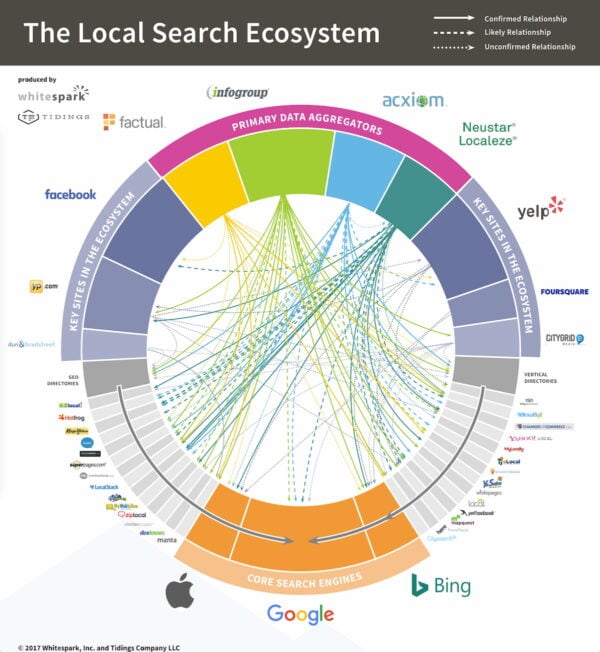Where to get citations
Unless you’re blatantly spamming, there isn’t a bad website on which to acquire a citation. But as with inbound links, specific citations are more valuable than others. Let’s take a look at the most valuable citation types below.
Data aggregators
Google has licensed existing databases in most countries to build its local business index rather than starting from scratch. In many cases, the licensors are the most prominent traditional yellow pages companies in each market. See how this local search ecosystem is connected.

Consumer directories
In addition to licensing data, Google searches the internet for local business citations. Citations from authoritative consumer directories (such as Foursquare, Yelp, or YP.com) carry more weight in helping your rankings than those from weak directories you’ve never heard of, like USCity.Net or ABLocal.
Whitespark has put together great resources that uncover the top consumer directories on which you should list your business.
The critical point is that the citation source’s quality matters far more than the number of sources you’re listed. Despite the marketing of certain business listing services touting “dozens” or “hundreds” of directories, the reality is that there are only a handful of cross-industry consumer directories on which you need to be listed.
Industry directories
As with inbound links, citations from industry-relevant websites help build the authority of your business. They also give Google a sense of the keywords for which your business is relevant.
Chances are that U.S.-based businesses can rattle off the important vertical directories in their industry. Sites like Avvo and Findlaw for Lawyers, Houzz and HomeAdvisor for contractors, WeddingWire and TheKnot for photographers, etc. These are the directories that regularly rank for the keywords that you want to rank for.
Businesses with an optimized thumbprint on these directories stand a better chance of ranking in Google for industry terms than businesses with a messy or missing thumbprint. Whitespark has put together a list of the top industry directories.
Local directories
Citations from local directories also increase the authority and credibility of listed businesses. As we mentioned, the member directories of your local chamber of commerce and neighborhood business association are great places to start. There may also be business listing websites that are popular with residents. Seek listings on similar sites in your business’s towns and cities.
On building citations online
It’s essential to be represented as cleanly and entirely as possible in as many online places as possible. However, it’s necessary to weigh the benefit of citations against their cost – whether in time or money.
Be where your customers expect you to be. If you run a deli, and every other deli in your city is on Yelp, you probably need to be on Yelp, too. If you’re a home decorator, and every other home decorator in your region is on Thumbtack, you probably need to be on Thumbtack, too.
Being where your customers expect you also means you’ll be where Google expects you to be. Citations beyond these prominent websites provide diminishing returns, so be wary of that fact as you evaluate signing up for new products or services.
Citations in the future
The importance of citations has gradually decreased over the years. Citations are a rudimentary ranking factor in an increasingly sophisticated local algorithm. Because they’re relatively easy to build, most successful small businesses will already have a strong citation profile.
In other words, citations have table stakes in the Local SEO poker game. You need a strong citation profile to compete. But if your business already has a strong profile, it’s unlikely that building a few more citations will move the needle much on your rankings.
Comments
Post a Comment